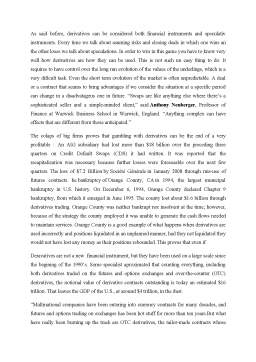Cuprins
- DEFINING DERIVATIVES 3
- DERIVATIVES, LOSES AND WININGS 4
- MILAN’S CASE 6
- BIBLIOGRAPHY 9
Extras din proiect
Derivatives- wining and losing
The financial crisis main effect was the drop in the value of the stocks and other types of financial instruments. Many investors were affected by it and by investors we refer to persons, firms, or even local administrations. The case of the derivatives scandal in Milan is one of these cases of uninspired investments combined with the greed of the local officials and banks. But before we discuss this case it is important to understand what derivatives are and how they circulate.
Defining derivatives
”Derivatives are financial contracts, or financial instruments, whose values are derived from the value of something else (known as the underlying). The underlying value on which a derivative is based can be an asset (e.g., commodities, equities (stocks), residential mortgages, commercial real estate, loans,bonds), an index (e.g., interest rates, exchange rates, stock market indices, consumer price index (CPI) ), weather conditions, or other items. Credit derivatives are based on loans, bonds or other forms of credit.”
The main types of derivatives are forwards, futures, options, and swaps.
Derivatives can be used to mitigate the risk of economic loss arising from changes in the value of the underlying. This activity is known as hedging. Alternatively, derivatives can be used by investors to increase the profit arising if the value of the underlying moves in the direction they expect. This activity is known as speculation.
Derivatives allow risk about the value of the underlying asset to be transferred from one party to another. For example, a wheat farmer and a miller could sign a futures contract to exchange a specified amount of cash for a specified amount of wheat in the future. Both parties have reduced a future risk: for the wheat farmer, the uncertainty of the price, and for the miller, the availability of wheat. However, there is still the risk that no wheat will be available due to causes unspecified by the contract, like the weather, or that one party will renege on the contract. Although a third party, called a clearing house, insures a futures contract, not all derivatives are insured against counterparty risk.
From another perspective, the farmer and the miller both reduce a risk and acquire a risk when they sign the futures contract: The farmer reduces the risk that the price of wheat will fall below the price specified in the contract and acquires the risk that the price of wheat will rise above the price specified in the contract (thereby losing additional income that he could have earned). The miller, on the other hand, acquires the risk that the price of wheat will fall below the price specified in the contract (thereby paying more in the future than he otherwise would) and reduces the risk that the price of wheat will rise above the price specified in the contract. In this sense, one party is the insurer (risk taker) for one type of risk, and the counterparty is the insurer (risk taker) for another type of risk.
Hedging also occurs when an individual or institution buys an asset (like a commodity, a bond that has coupon payments, a stock that pays dividends, and so on) and sells it using a futures contract. The individual or institution has access to the asset for a specified amount of time, and then can sell it in the future at a specified price according to the futures contract. Of course, this allows the individual or institution the benefit of holding the asset while reducing the risk that the future selling price will deviate unexpectedly from the market's current assessment of the future value of the asset.
The use of derivatives can result in large losses due to the use of leverage, or borrowing. Derivatives allow investors to earn large returns from small movements in the underlying asset's price. However, investors could lose large amounts if the price of the underlying moves against them significantly.
Because the value of a derivative is contingent on the value of the underlying, the notional value of derivatives is recorded off the balance sheet of an institution, although the market value of derivatives is recorded on the balance sheet.
Preview document
Conținut arhivă zip
- Derivatives - Winning and Losing.doc
















